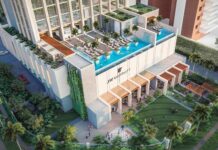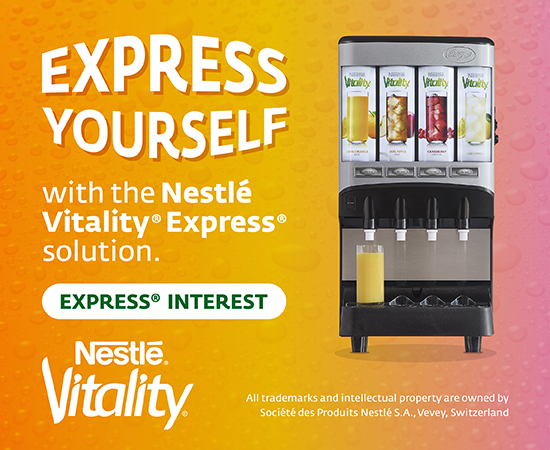Hospitality Ventures Management Group (HVMG)—an Atlanta-based, private hotel investment, ownership, and management company—this week launched its fourth lifestyle hotel—the 163-room Plunge Beach Hotel in Lauderdale-by-the-Sea, Fla. The upscale lifestyle hotel focuses on its custom-created food and beverage outlets, which are designed to attract guests and local alike. HVMG SVP and COO, Richard Jones, spoke with LODGING at the 2017 NYU International Hospitality Industry Investment Conference about the group’s increased focus on the lifestyle segment, and the importance of F&B for creating a truly authentic lifestyle property.
What is significant about the new Plunge Beach Hotel?
We’re making a very strategic and intentional move to get more lifestyle properties into our portfolio. Our platform can add a lot of value for owners that are in or want to get in the lifestyle space. It’s the fastest growing segment of the business from a new property development and conversion perspective. The guests love it, and the markets are responding very well. The brands are offering all of these different options—from branded boutique like Hotel Indigos, to soft brands and pure independent properties. There’s a lot of room there to get creative and we want to be part of that.
Which brings us to Plunge. The hotel is comprised of three different buildings that sit right on the beach. Through the property’s programming and design, we’ve been able to create three distinct experiences depending on the room type and where the rooms are located. We designed three custom food and beverage and retail outlets—Backflip Beach Bar, Octopus Lobby Gastropub, and the Barnacle and Bean Coffee Shop serving locally roasted coffee, fresh sandwiches, and gelato.
What does HVMG’s portfolio makeup look like now, and where do you want it to be?
We are currently operate 33 hotels. About 80 percent are full service and our portfolio is predominately branded. We are currently operating three true lifestyle hotels—about 10 percent of the portfolio. The branded full-service hotels are the core of our business today, and they will probably be the core of our business going forward. But in the next 18 or 24 months, I’d love to see the number of true lifestyle hotels increase to a third of our portfolio. Opportunities will determine where we can take it from there.
What is HVMG’s approach to F&B?
We’ve added some talent to our team over the last year and a half specifically focused on food and beverage. We hired Garron Gore, our corporate director of food and beverage innovation. He came to us from the restaurant and bar side of the business, but with some hotel experience. We really wanted somebody approaching our F&B with a pure, independent restaurant/bar mindset. We’ve attracted culinary talent to help develop menus and the food program, and worked with a number of consultants on developing beverage programs. Garron has been leading the charge on playing a really active role on the design and the concepting of these restaurants and bars.
At Plunge, all of those outlets are conceived by, designed by, and programmed by us. We’ve been using the same approach at our other lifestyle hotels as well. For example, our most recent Hotel Indigo, the Hotel Indigo Denver Downtown, which opened in February, has a stand-alone restaurant called Hearth & Dram. Hearth & Dram represents the poster child right now for what we think we can do to deliver a really creative, locally-inspired, and locally-driven concept that will add value to the hotel experience. We conceived, led the design, and led the creation of that, too. It has a great menu, a bourbon program with 300 bourbons, an open-hearth kitchen, and a meat-heavy menu.
We approach our lifestyle properties with the mindset that the food and beverage experience is really what defines lifestyle and independent hotels. You want them to be a place with constant, steady volume where the locals want to go. You don’t want to be a typical hotel restaurant experience. F&B should put the hotel on the map more so than the hotel putting the restaurant on the map.
Is the lifestyle segment becoming saturated?
I think that the lifestyle segment is definitely going to grow. Saturated, probably not. It’s going to constantly evolve. If you ask three different people, “what’s a lifestyle hotel,” you’ll get three different answers. Everybody’s got their own kind of interpretation of it. What’s cool and hip today is not going to be a cool and hip thing in three years. So how do you change it and keep it relevant and current? I think that’s going to be a big challenge for owners from a capital or reinvestment perspective. It’s going to be a big challenge on the food and beverage front—tastes change, trends come and go, and there’s always going to be new competition coming in. I think that’s going to be something that will separate some of the winners and the losers in the long run—who can find that balance between maintaining and sustaining an operation and keeping it relevant and in a market leadership position, versus just being that flash in the pan. However, I would say that we’re more saturated with brands right now. I’m more worried about being over saturated with brands versus the lifestyle segment.











